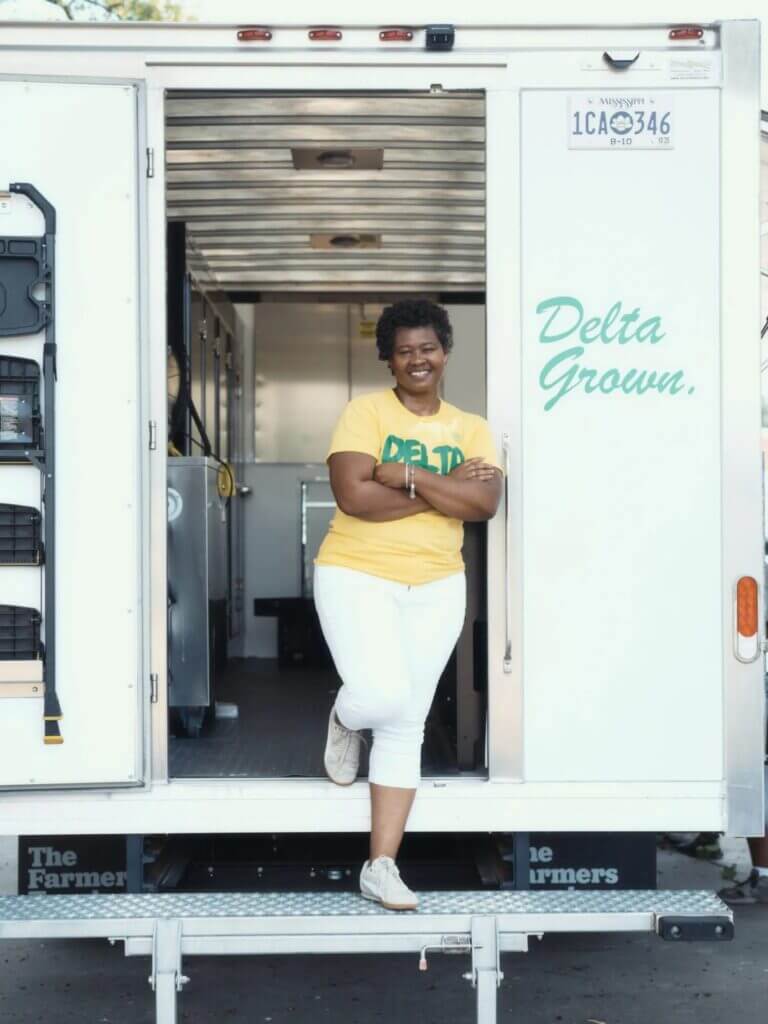
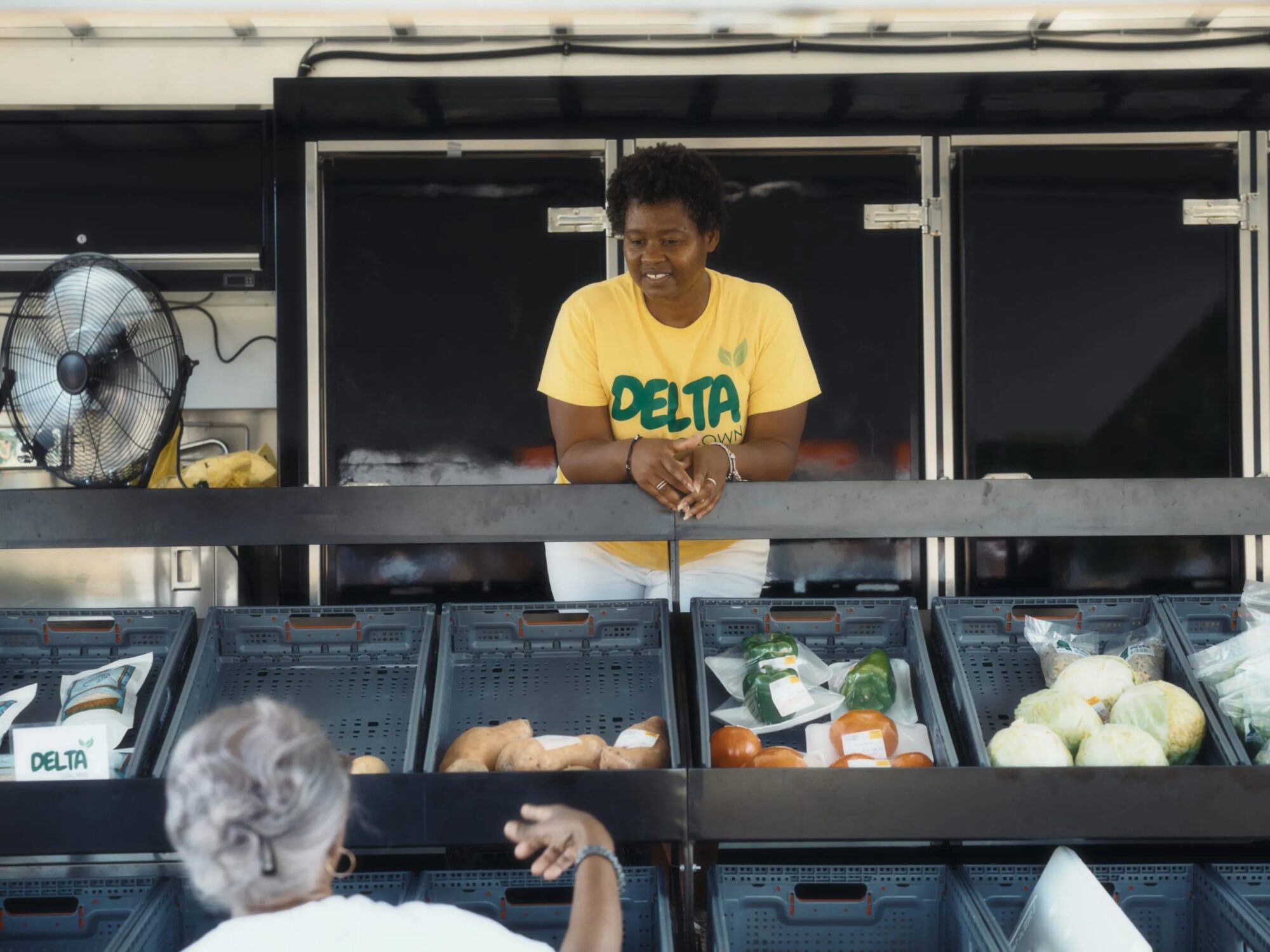
OAKLAND, Miss. — Grocery store owner Marquitrice Mangham hurries out of the sweltering August heat of the Mississippi Delta and enters her newly opened Farmacy Marketplace.
She arrives about an hour before the doors open at 10 a.m.
It’s a quiet Friday in Oakland, Mississippi, except for the occasional screech of tires from semitrucks passing by on Highway 51. Oakland, fewer than 30 miles from her hometown of Webb, is home to about 400 residents, more than half of whom are Black.
Inside the store, Mangham greets and praises her assistant manager, Kini Bradford-Jefferson. She emphasizes that without her, the store couldn’t operate. They laugh, ask each other how they are doing and tidy up the 3,000-square-foot space.
Until April, Oakland had been without a grocery store.
In rural areas, particularly in the Delta, residents face some of the highest rates of food insecurity and unemployment in the state, resulting in poor health outcomes such as obesity, hypertension, and diabetes. These communities have high populations of Black people. They often struggle to attract grocery stores and are overwhelmed by a striking growth of dollar stores.
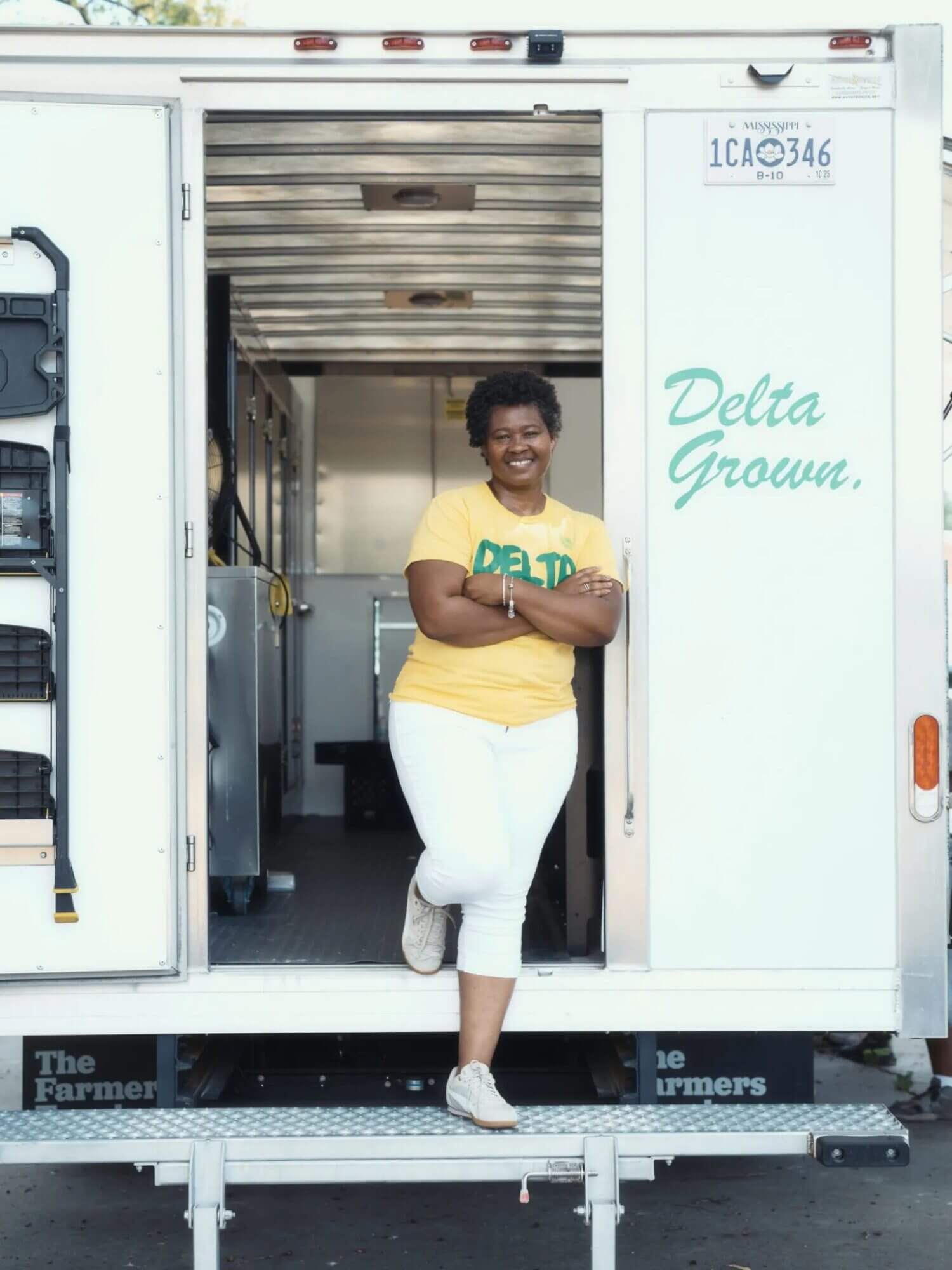
Credit: Justin Hardiman/Capital B
Around 14% of Americans — more than 47 million people — were food insecure at some point during 2023, according to an Associated Press analysis of U.S. Census Bureau and Feeding America data.
Mississippi had a food insecurity rate of 18%, higher than the national rate.
The U.S. Department of Agriculture will stop collecting and releasing statistics on food insecurity after October 2025, saying the numbers had become “overly politicized.” The decision comes in the wake of federal funding cuts for food and nutrition safety net programs nationwide.
Getting consistent support from the government to fight hunger is often a struggle. For the second year in a row, the Mississippi Department of Health and Human Services opted out of a federal program that would’ve provided kids with $40 in grocery assistance in the summer months. Advocates worry this decision could increase hunger and health issues. Recent federal cuts to the Supplemental Nutrition Assistance Program and the elimination of grants geared to help farmers and improve food access compound the problem.
Despite all these challenges, Black women like Mangham are stepping up. From grocery stores to food distribution services, they’re leading community-centered solutions to feed their families and improve the health and well-being of their neighbors.
Local grocer fills a crucial need
Community leaders in Oakland requested a supermarket after learning of Mangham’s first store in Webb, which she opened in 2022.
Oakland resident Bradford-Jefferson said there hadn’t been a place to shop for everyday necessities since she was a child. There’s only a library, food service plant, post office, bank and medical clinic. Like other residents, Bradford-Jefferson traveled to the nearest town to purchase food from stores such as Walmart or Piggly Wiggly.
She used to drive regularly to her retail job in Batesville, a 40-mile round trip. Not only did she get a job closer to home, but she’s been able to cut back on expenses such as gas.
“I can walk here (to work) if I had to,” she said.
The bell above the door chimed as the store doors swung open, welcoming the first customers of the day. They excitedly greeted Bradford-Jefferson before hugging Mangham.
It felt as if everyone knew everyone.
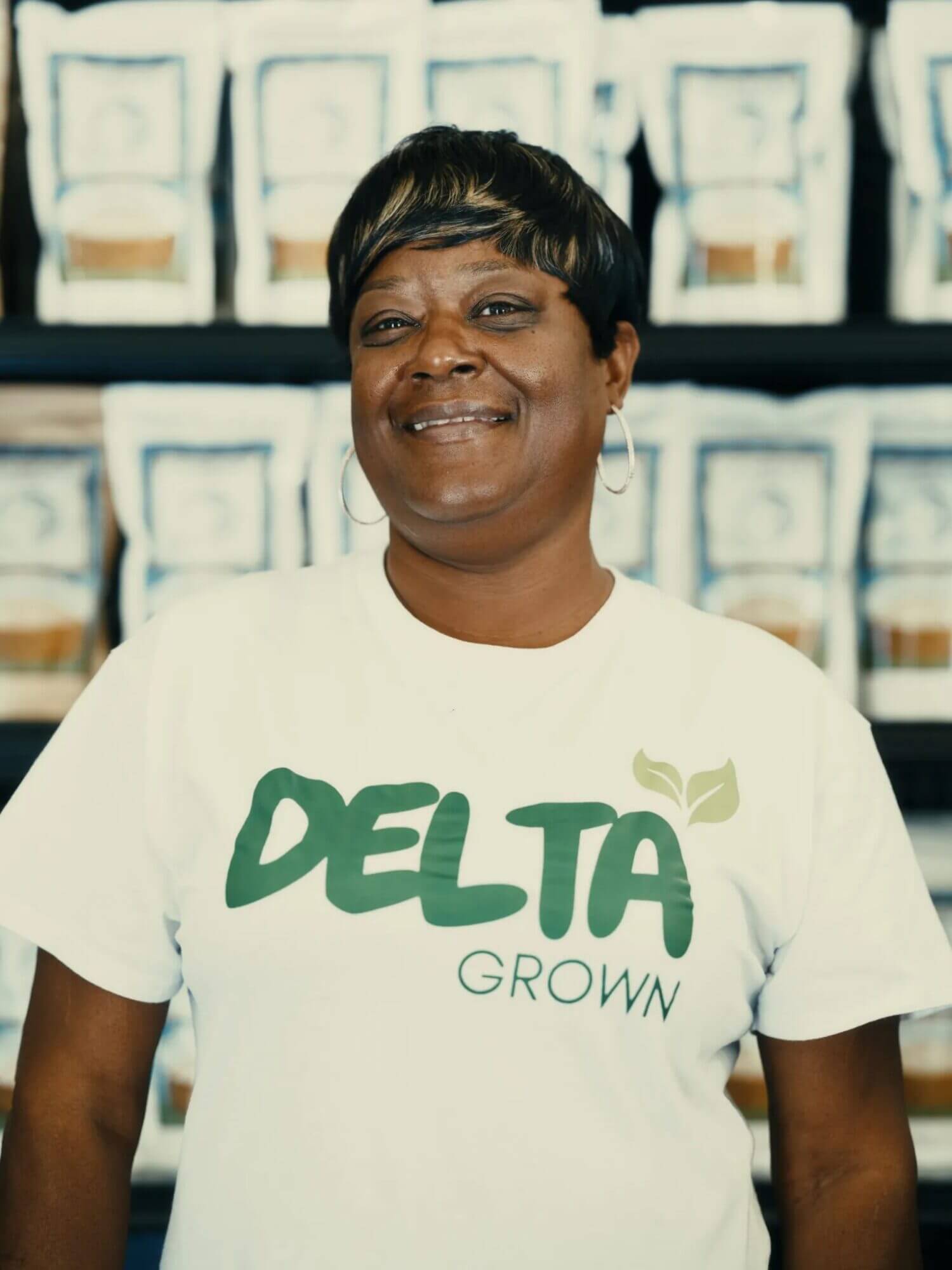
Bradford-Jefferson seamlessly transitioned from ringing up purchases on the cash register to prepping meat at the deli station for two men on their lunch break.
The 58-year-old understands that the store is needed for her town, as well other rural areas where food access is limited.
“You got to think of the elders, and some people don’t have vehicles and can’t afford to pay people to take them to other towns to shop,” she said. “It’s a good thing for this community and the surrounding communities.”
Mangham grew up on a family farm in Webb, a majority-Black town of fewer than 500 people. They grew soybeans, corn, fruits and trees, and managed livestock (cows and hogs) on over 200 acres of land.
Back then, they “lived off the land,” meaning most of the food they consumed, they grew themselves. Even if they wanted to visit a grocery store, they had to drive 20 to 30 miles. But, as a child, Mangham didn’t grasp the severity of the situation.
The 48-year-old military veteran moved away after high school, eventually settling in Atlanta. In 2016, she inherited her family’s farm, which brought her back to Webb more frequently. She began paying closer attention to the food disparities.
It was worse than when she left nearly 25 years ago.
“My 89-year-old grandmother has to drive 15 to 20 miles just to get fresh food,” Mangham said. “She’s a diabetic and has this special diet.”
In 2023, Tallahatchie County, where Webb is located, 21% of people reported food insecurity in their household, higher than the state and national rates, with about 2,610 people who were food insecure.
Mangham’s nonprofit, In Her Shoes Inc., began in Atlanta and focuses on improving access to food and supporting farmers. But she recognized a greater need for these programs in the Delta. She conducted research, secured funding and successfully launched her first Farmacy Marketplace store.

She also teaches families how to prepare meals that cater to their specific health care needs and how to properly store fresh foods. The store also implemented the Double Up Food Bucks program, which encourages SNAP recipients to buy fresh fruits and vegetables.
Inspired, other communities — like Oakland — have reached out for guidance.
“The most important thing was it showed so many other communities that this can be your community, too,” she said.
Online delivery services for those without transportation
About 19 miles away in Drew, Gloria Dickerson is working to uplift her community “from poverty to prosperity,” the mission of her youth nonprofit.
Providing residents with the resources to achieve food security is her North Star.
Despite growing up in poverty, Dickerson and her family knew how to put food on the table. Her parents, Mathew and Mae Bertha Carter, were sharecroppers who lived with their 13 children on a plantation near Drew. They grew a garden filled with fruits, vegetables and beans.
But that was snatched away when the children decided to do the unthinkable: integrate the “all white” Drew High School in 1965, becoming the first Black family to do so. Their house was shot at, credit in local stores was cut off, the garden was plowed up and they were evicted.
Mae Bertha was fortunate to have a friend in the civil rights activist Fannie Lou Hamer, who lived less than 10 miles away. Hamer sent Charles McLaurin, her campaign manager and fellow activist, to check on the family, Dickerson recalled. This came with a wave of support from other civil rights workers who assisted the family with finding a home in Drew.
At the time, Main Street in downtown Drew had retail stores, grocery stores and even “nickel and dime stores,” Dickerson remembered.

Credit: Justin Hardiman/Capital B
More than 60 years later, the same street in the 77% Black town of 2,000 people is different. Today, there are not many businesses. There’s Stafford’s Deli and Dickerson’s nonprofit We2Gether Creating Change, which operates out of several buildings on the street. In the town, there’s no grocery store. It closed in 2012. There’s only one Dollar General, which has some frozen foods. In Sunflower County, where Drew is located, 22.8% of people reported food insecurity in their household in 2023.
Dickerson noticed that many children in her programs often came to class hungry. Although she provided food, it still wasn’t enough. Along with other organizers, she created a group called Drew United for Progress. During a community discussion, residents repeatedly expressed a need for a grocery store.
“(They said), ‘We can’t buy an apple. We can’t buy a banana. We can’t buy any vegetables,’” she said. “’We have to hire somebody to take us out of the community to pay them $10 to get there, pay them $10 to get back and that takes away from the money we have to put on food.’”
They then formed the Drew Collaborative, which included experts to research the feasibility of a store. The market analysis found the town was too small to support a grocer. Instead of pursuing a supermarket, the collaborative launched the Grocery Online Ordering Distribution Service (GOODS) in 2021.
Residents of Drew, Ruleville, Parchman and Rome are able to place food orders online. The food is stored at the National Guard Armory for delivery or pickup. This initiative was initially funded by HOPE Credit Union in the Mississippi Delta. The nonprofit provides iPads and education on how to order food because of limited broadband and digital literacy concerns.
The program expanded to Shaw, about 27 miles from Drew. With the rising cost of food, more families need assistance. There are still some people who are left behind, said Chiquikta Fountain, former director of Delta Hands for Hope, which shepherds the program in Shaw.
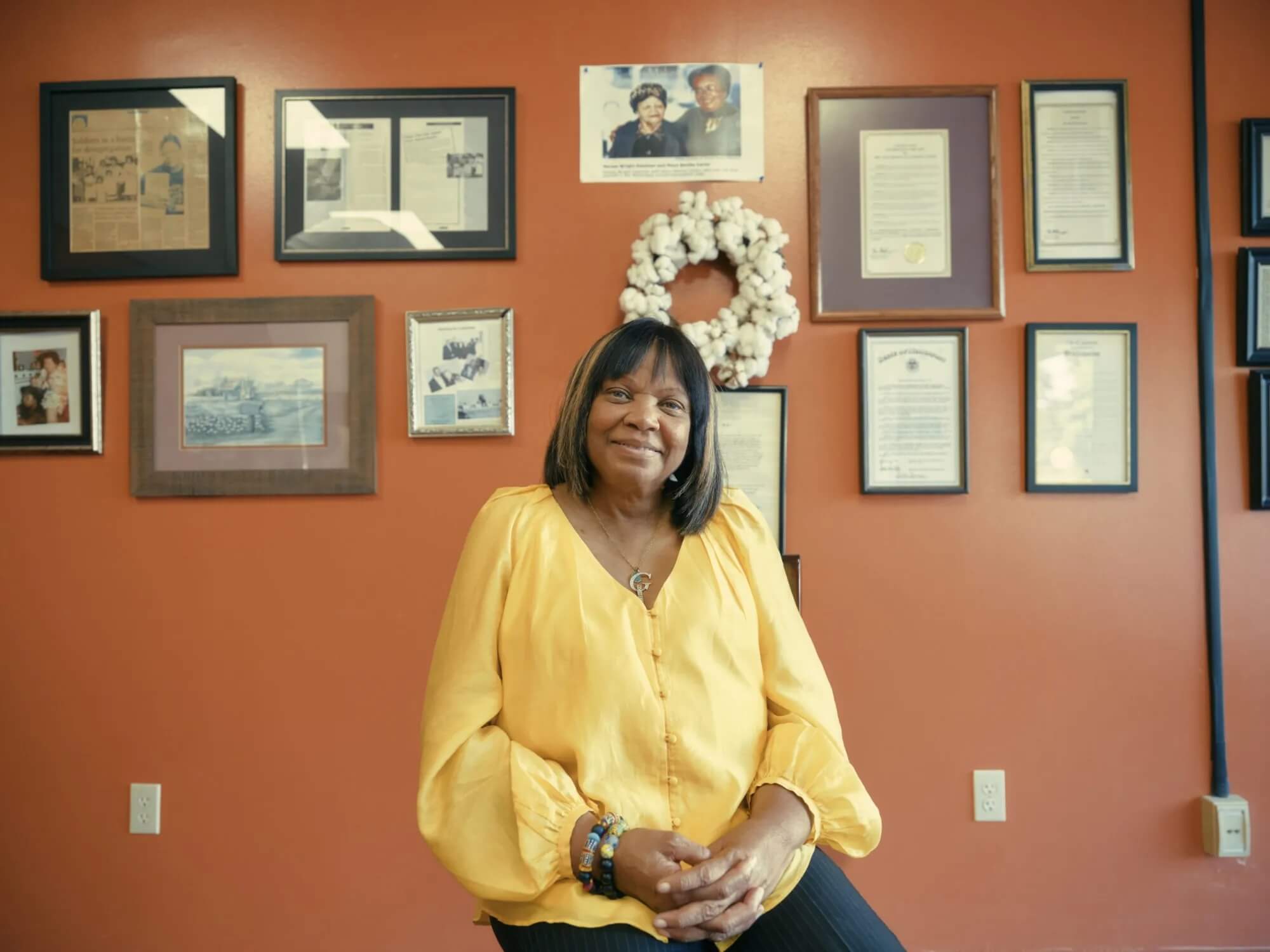
Credit: Justin Hardiman/Capital B
“On a state level, we have a legislature that doesn’t value what it means for children and communities to be food secure,” she said. “They’re not working hard enough to make sure that people who make a living wage are able to buy food and not have to play Russian Roulette with what’s going to be a priority this month.”
In Drew, Dickerson responded by hosting a monthly food pantry.
This fall, We2Gether Creating Change will launch family gardens, where at least 10 families will have ownership of a plot of land. This project will teach them how to grow their own food, which they can use to feed their families or sell. Each family will also receive a $200 stipend to keep their garden up, and youth workers will get paid to help out in the summer.
Dickerson hopes to evolve this work into garden parties, cooking classes and more. Her biggest concern is that if food insecurity goes unchecked, it will affect the mental well-being of children and their ability to perform well in school.
Her call to action is for people to get involved, especially because the Delta was ground zero for the Civil Rights Movement, and everyone benefits from those sacrifices — from death and loss of jobs to political violence.
“People need to remember where they really came from and who was on the battlefield, fighting for them to have what they have right now … it was the people that lived in these small communities putting their lives on the line,” Dickerson said. “Don’t forget us.”
Growing the next generation
Back in Oakland, once business at Farmacy Marketplace is up and running, Mangham drives nearly 63 miles from the Oakland store to Mound Bayou to open her mobile grocery store around noon.
A few days earlier, she made the 12-hour trek from her residence in Atlanta to Mississippi. It’s part of her weekly routine. She spends a few days in Atlanta and then heads to her beloved home state to manage not one, but two, grocery stores.
It’s a sacrifice she doesn’t mind making.
Founded by formerly enslaved cousins, Mound Bayou is considered the “jewel of the Delta.” It is known as a self-reliant Black community that provided solace and refuge from the threats of the Jim Crow South. During the trial of Emmett Till’s murderers, the town became home to his mother, Mamie Till Mobley, the Black press — including Simeon Booker with Jet Magazine — and witnesses.
Mangham’s mobile truck is parked on the site of the now-shuttered Taborian Hospital, which exclusively admitted Black patients and staff during a time when other health care facilities didn’t accept Black folks. It’s across the street from a gas station, and near the high school, which closed in 2018 and now houses the Mound Bayou Museum of African American History and Culture.
Every Friday, the truck is in Mound Bayou from noon to 4 p.m. It is also stationed in Jonestown on Tuesdays and Coffeeville on Fridays.
Thirty minutes after opening, residents trickled in, asking about watermelon and selecting from a variety of frozen meats, fruits and vegetables. On that day, James Edwards Jr., a retired vocational instructor, traveled from his home in Marks to help out with the mobile market. As his wife, Maudy Edwards, assisted customers, James sat in a chair under a shaded tree, greeting and conversing with residents.
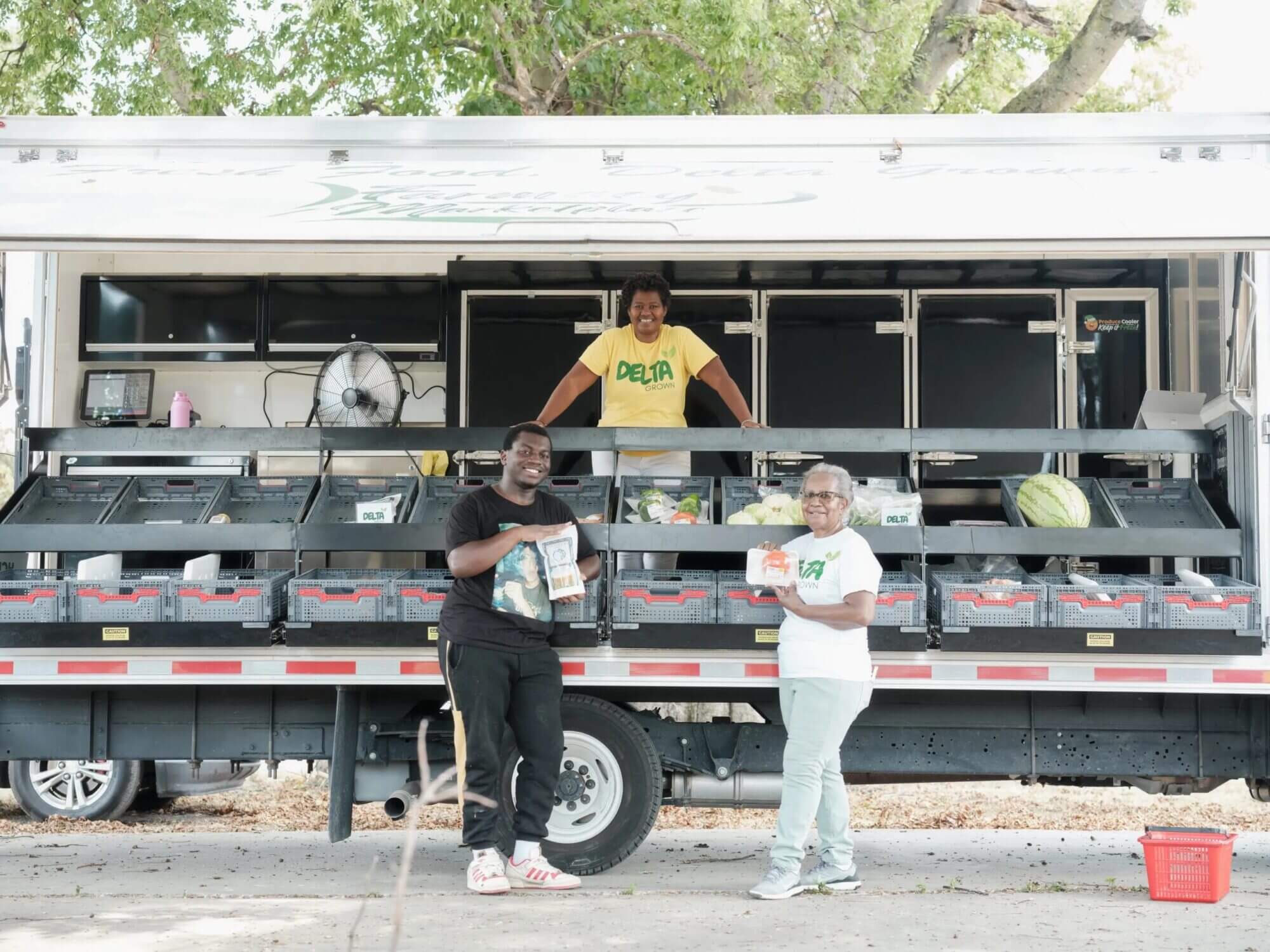
Usually, he’s repairing or cleaning the mobile grocery truck. He makes sure it’s filled with gas and ensures the food is frozen and up to temperature. When he’s not on site helping with the mobile truck, he’s at the distribution center in Lambert or at the stores.
“It’s been a pleasure to do this because we bring in food to what we call desert communities, where we don’t have the grocery store,” Edwards said. “My wife and I think this is a wonderful thing, and I know it’s gonna grow, but it’s like a young baby, it’s got to be nourished. You gotta be on milk before it grows so and it’s a blessing to Mississippi.”
In Her Shoes received a grant in 2023 to build a chicken processing facility, which will allow Black farmers to make more money by processing their products. The organization is set to break ground on the facility in October.
“Mississippi has a billion-dollar poultry industry, but … there are no private processing facilities for the smaller farmers to be able to get their poultry into local stores,” Mangham said.
Mangham’s work provides not only a market for farmers to sell their produce and allow residents to purchase fresh foods, but also an avenue to get young people involved. She created an apprenticeship program that pairs students with farmers to learn how to grow produce.
In Bolivar County, where Mound Bayou is located, 24.4% of people reported food insecurity in their household in 2023. Addressing the issue takes more than opening two stores and providing a temporary mobile food truck, Mangham said. She’s looking at other avenues, like partnering with pharmacies to bring in a fresh food kiosk or refrigeration to store meats and vegetables. She’s also working to convert shipping containers into permanent corner grocery stores.
This work can be overwhelming and exhausting, but Mangham continues because of the community’s support, she said.
“When I see the 75-year-old lady come in and buy all of her groceries, and she doesn’t have to drive … that’s the kind of thing that makes it all worth it,” she said with teary eyes.
She added that her work has inspired others. “Nobody wants to invest in these rural communities. They don’t want to invest in the people. But just do what’s put on your heart to do, and the rewards will come.”
Associated Press data reporter Kasturi Pananjady contributed to this report. This reporting is part of a series called Sowing Resilience, a collaboration between the Institute for Nonprofit News’ Rural News Network and The Associated Press. Nine nonprofit newsrooms were involved: The Beacon, Capital B, Enlace Latino NC, Investigate Midwest, The Jefferson County Beacon, KOSU, Louisville Public Media, The Maine Monitor and MinnPost. The Rural News Network is funded by Google News Initiative and Knight Foundation, among others.
- Former Greenwood police officer pleads guilty to federal drug trafficking charges - February 27, 2026
- UMMC officials say normal operations will resume Monday after cyberattack - February 27, 2026
- Hinds County public defender: Office needs additional funding to avert constitutional crisis - February 27, 2026